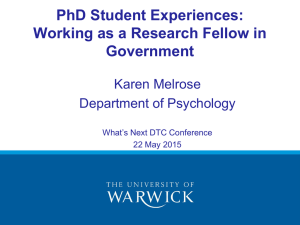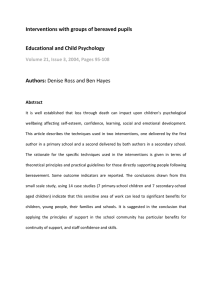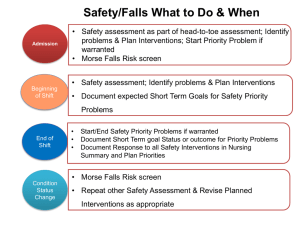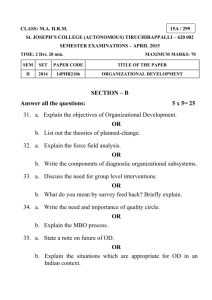Complexity DTC mini-project 2009
advertisement
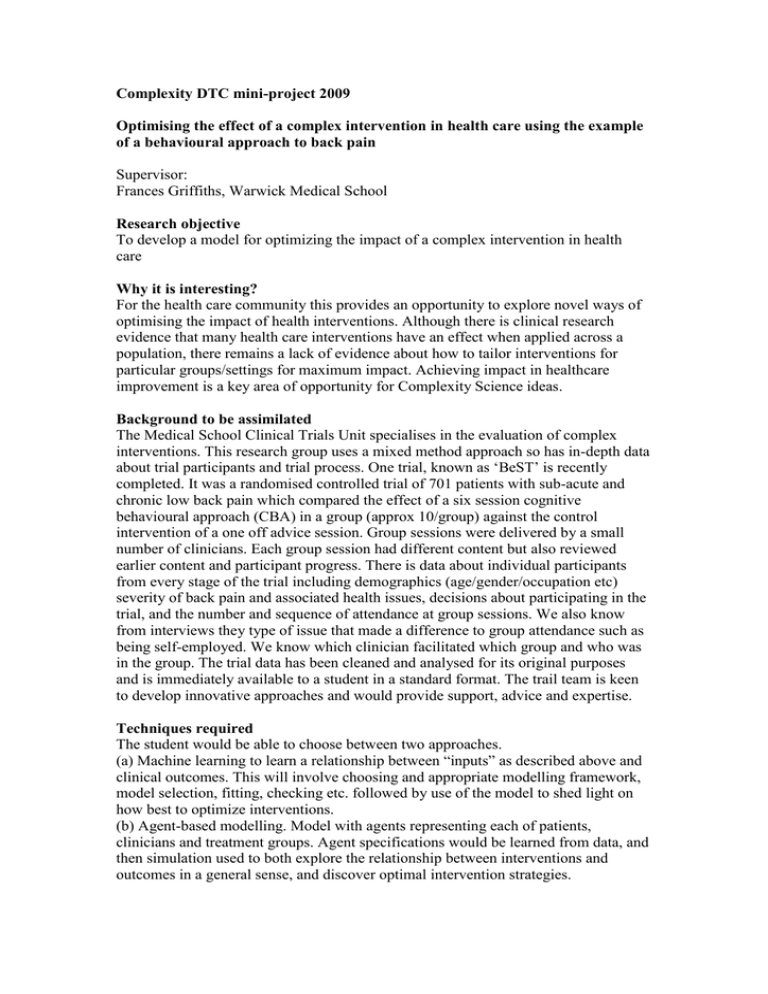
Complexity DTC mini-project 2009 Optimising the effect of a complex intervention in health care using the example of a behavioural approach to back pain Supervisor: Frances Griffiths, Warwick Medical School Research objective To develop a model for optimizing the impact of a complex intervention in health care Why it is interesting? For the health care community this provides an opportunity to explore novel ways of optimising the impact of health interventions. Although there is clinical research evidence that many health care interventions have an effect when applied across a population, there remains a lack of evidence about how to tailor interventions for particular groups/settings for maximum impact. Achieving impact in healthcare improvement is a key area of opportunity for Complexity Science ideas. Background to be assimilated The Medical School Clinical Trials Unit specialises in the evaluation of complex interventions. This research group uses a mixed method approach so has in-depth data about trial participants and trial process. One trial, known as ‘BeST’ is recently completed. It was a randomised controlled trial of 701 patients with sub-acute and chronic low back pain which compared the effect of a six session cognitive behavioural approach (CBA) in a group (approx 10/group) against the control intervention of a one off advice session. Group sessions were delivered by a small number of clinicians. Each group session had different content but also reviewed earlier content and participant progress. There is data about individual participants from every stage of the trial including demographics (age/gender/occupation etc) severity of back pain and associated health issues, decisions about participating in the trial, and the number and sequence of attendance at group sessions. We also know from interviews they type of issue that made a difference to group attendance such as being self-employed. We know which clinician facilitated which group and who was in the group. The trial data has been cleaned and analysed for its original purposes and is immediately available to a student in a standard format. The trail team is keen to develop innovative approaches and would provide support, advice and expertise. Techniques required The student would be able to choose between two approaches. (a) Machine learning to learn a relationship between “inputs” as described above and clinical outcomes. This will involve choosing and appropriate modelling framework, model selection, fitting, checking etc. followed by use of the model to shed light on how best to optimize interventions. (b) Agent-based modelling. Model with agents representing each of patients, clinicians and treatment groups. Agent specifications would be learned from data, and then simulation used to both explore the relationship between interventions and outcomes in a general sense, and discover optimal intervention strategies. Prospective deliverables A computational model - either machine learning or agent-based – for the BeST trial. Relation to end/downstream users This mini-project will feed directly into the programme of innovation for evaluation of health care at the Medical School. The programme undertakes evaluation funded by the UK health service for direct patient benefit. The project will help us know how to improve evaluation so we know who could benefit and how from complex health interventions. Prospects for this mini project leading into a PhD project Excellent The approach developed in this mini-project can be further developed and refined in a PhD and tested against the BeST data set and potentially other clinical trials of complex interventions.

